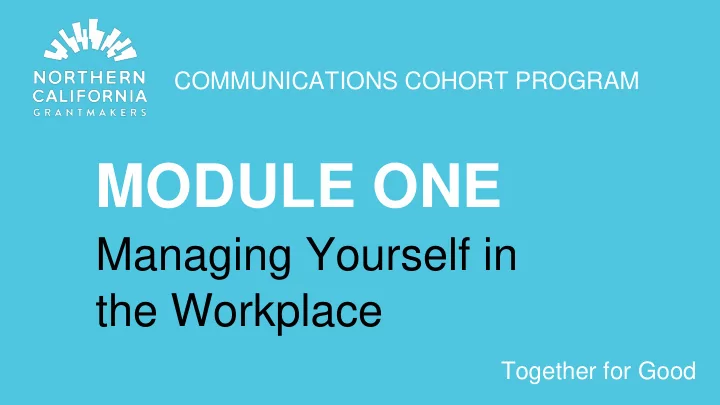

1 Module 1 COMMUNICATIONS COHORT PROGRAM MODULE ONE Managing Yourself in the Workplace Together for Good Together for Good Together for Good
2 Module 1 OUTCOMES • Knowledge of the Emotional Intelligence (EQ) framework. • Insight into deploying personal and social strengths. • Practice identifying and navigating blind spots. • Understanding of the influence of race and social equity on personal competence. Together for Good
3 Module 1 TODAY • Check-In Activity • What is EQ? • Self-Awareness – Loving your Triggers • Self-Management – Exploring Power Dynamics • Reflection and Synthesis • Closing Together for Good
4 Module 1 WHY IS EQ IMPORTANT FOR PROFESSIONAL GROWTH? Together for Good
5 Module 1 Together for Good
6 Module 1 58% 90% Together for Good
7 Module 1 THE JOHARI WINDOW Together for Good
8 Module 1 Together for Good
9 Module 1 Together for Good
10 Module 1 Together for Good
11 Module 1 POSITIVE TRIGGERS Together for Good
12 Module 1 WHAT RELIABLY CATALYZES POSITIVE EMOTIONS AT WORK? TAKES AND KEEPS YOU ABOVE THE LINE? Together for Good
13 Module 1 NEGATIVE TRIGGERS Together for Good
14 Module 1 We are emotional creatures. Our first reaction to an event is always going to be an emotional one. We have no control over this process. When something generates a prolonged emotional reaction in us it is called a trigger event . Together for Good
15 Module 1 Emotions? How sustained? Physical In absence of… feelings? Disarm? THE EVENT Cause? Let go of? Memory? Familiarity? What else? Together for Good
16 Module 1 PAIR SHARE • Briefly describe your trigger event and its impact on you. • Who would you be in the absence of this trigger? What would be possible? Together for Good
17 Module 1 SELF-AWARENESS STRATEGIES • Stop treating your feelings as good or bad • Observe the ripple effect from your emotions • Lean into your discomfort • Feel your emotions physically • Know who and what pushes your buttons • Watch yourself like a hawk • Keep a journal about your emotions • Don’t be fooled by a bad mood Together for Good
18 Module 1 EXPLORING POWER DYNAMICS Together for Good
19 Module 1 PRIVILEGE AND MARGINALIZATION • Privilege is a set of unearned benefits, rights, and access granted to people based on their membership in certain groups. • Marginalization is the process of pushing a particular group or groups of people to the edge of society by not allowing them an active voice, identity, or place in it. • Privilege provides access. • Access provides power. • Greater access equals greater power. • We must acknowledge both our marginalized identities as well as our privileged identities. Together for Good
20 Module 1 MAP MY ACCESS • Use the worksheet provided. • On the left side of the worksheet, list ways in which you do not have identity privilege or access. • On the right side of the worksheet, list the ways in which you experience privilege or access based on your identity. • Make note if you identify ways in which these identities minimize or multiply one another. Together for Good
21 Module 1 PAIR SHARE • Take turns sharing the columns of your worksheet, both areas of privilege and marginalization. • Listen thoughtfully while your partner shares. Together for Good
22 Module 1 CONNECTING YOUR TRIGGER • Think back to the trigger identified earlier, begin to identify the ways in which power, privilege, access, and marginalization play out in your trigger. • Turn to your partner and share what you’ve identified. As your partner shares, feel free to share additional ways in which power, privilege, access, and marginalization may have impacted the trigger. Together for Good
23 Module 1 LARGE GROUP DISCUSSION • With your partner’s permission, share key insights that surfaced during your discussion. • Did anything surprise you? • Were there commonalities or patterns between you and your partner? Together for Good
24 Module 1 MANAGE YOUR TRIGGERS Together for Good
25 Module 1 Together for Good
26 Module 1 THE EMOTIONAL BRAIN Together for Good 26
27 Module 1 THE EMOTIONAL BRAIN Together for Good 27
28 Module 1 Our first reaction to an event is always going to be an emotional one. We have no control over this process. But we do control the thoughts that follow an emotion, and we have a great deal of say in how we react to an emotion. Together for Good
29 Module 1 MANAGE YOUR TRIGGERS • What would it take to disarm this trigger, to release it? • What would you need to learn? • What might you need to let go of? Together for Good
30 Module 1 SELF-MANAGEMENT STRATEGIES • Breathe right • Create an Emotion vs Reason List • Count to ten • Sleep on it • Talk to a skilled self-manager • Smile and laugh more • Set aside some time in your day for problem solving • Take control of your self-talk Together for Good
31 Module 1 REFLECTION AND SYNTHESIS Together for Good
32 Module 1 REFLECTION AND SYNTHESIS • What have you heard today that was new or surprising? • What did you already know but now know in a new way? • What do you still have questions about? • As you consider increasing your personal competence (self- awareness and self-management skill), what is an EQ strategy you’d like to experiment with? Together for Good
33 Module 1 HOMEWORK • Read Emotional Intelligence 2.0 • OPTIONAL - take the EQ Self-Assessment • Make a list of other trigger moments you regularly experience at work. Identify the themes across all of these examples and how they illuminate further insights for understanding the conditions for these triggers, the emotions that get activated, and how to manage these emotions. Together for Good
34 Module 1 THANK YOU! Together for Good
Recommend
More recommend